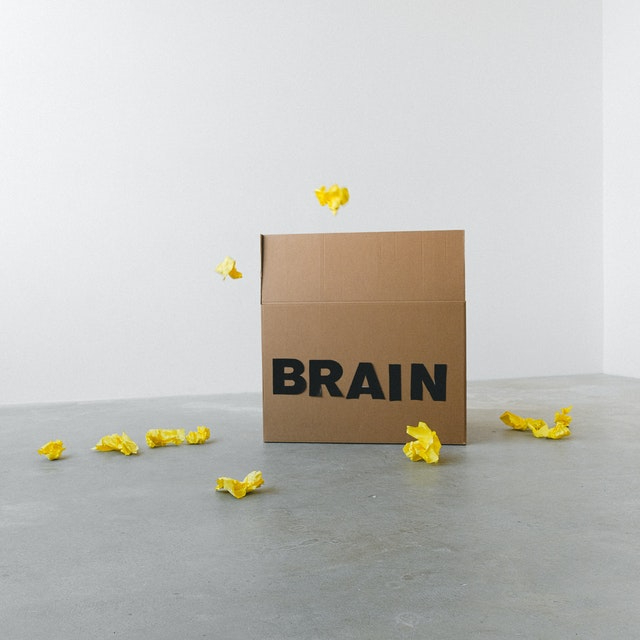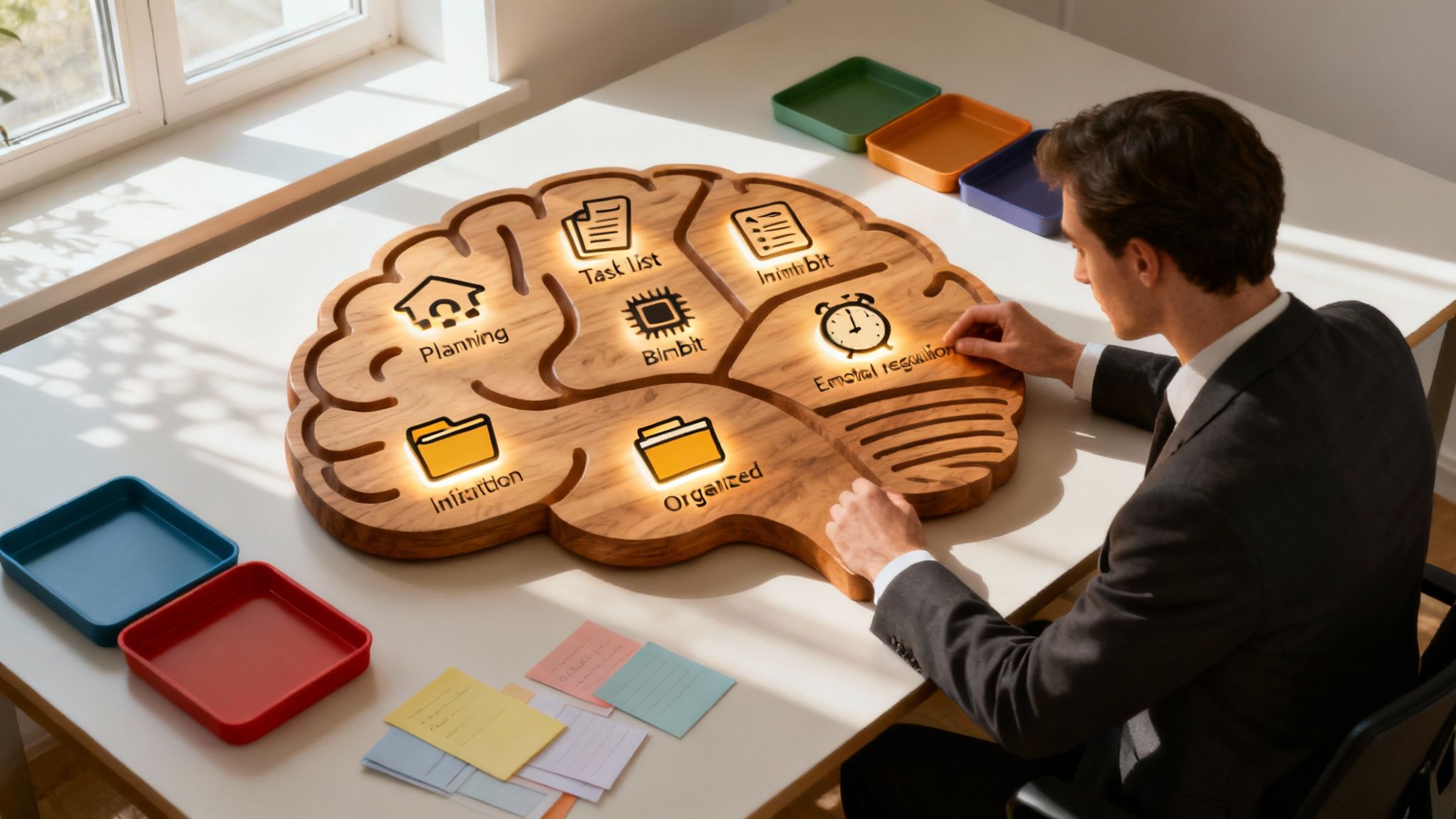Have you ever found yourself running late to yet another appointment when you were certain you had 10 minutes to spare?
Or maybe you’ve found yourself walking into a room to get something, only to stop in your tracks because you totally blanked on what you were going in there for in the first place?
Or perhaps you've spent more time than you’d like pacing aisles in a grocery store, paralyzed by all the options in front of you?
If you answered yes to any of the questions above — you’ve experienced executive dysfunction.
What is executive dysfunction?
Executive dysfunction is a little more complex than just running late or forgetting things. First, we need to understand what executive function is.

Executive functions are a set of mental skills that include working memory, flexible thinking, and self control—skills we use to manage our daily lives.1 Issues with executive functioning can make it challenging to focus, follow directions, and regulate emotions—which is described as executive dysfunction.
Executive dysfunction isn’t an official diagnosis, but rather a set of symptoms associated with attention-deficient/hyperactivity disorder (ADHD). Executive dysfunction is also common in people who experience brain injuries or trauma, and also in autistic people.2
Not to mention, anyone can experience it throughout their lives, but it’s especially challenging for the populations mentioned above. But for the purposes of this blog, we’ll focus on how executive dysfunction manifests in people with ADHD.
What are the executive functions?
Executive functions are controlled by the brain’s frontal lobe, which is responsible for:
- Planning and organization
- Emotional and behavioral control
- Working memory3
- Personality
- Problem-solving
- Attention
- Social skills
- Flexible thinking
- Conscious movement
How does executive dysfunction develop?
Executive functions develop over time, and don’t fully mature until late teens or early 20s.4 Since the frontal lobe is affected in people with ADHD, it can take 3 to 5 years longer than the average person for their executive functions to fully develop.5
Executive dysfunctions can be inherited, with studies showing a hereditary rate of 20 to 40%.6
One in four people with ADHD have a parent who also has ADHD, and the other 75% are likely to have a close relative with ADHD.
Common executive functioning deficits among ADHDers

Dr. Russel Barkley is a prominent ADHD researcher who studied executive functioning in people with ADHD. Barkley breaks executive functions down into four main areas:
- Nonverbal working memory
- Internalization of speech (verbal working memory)
- Self-regulation of affect/motivation/arousal
- Reconstitution (planning and generativity)
Barkley noted that these inabilities to self-regulate are at the root of many challenges faced by people with ADHD. According to Barkley, ADHDers often exhibit delay aversion, causing them to act impulsively without fully considering consequences.7
Let’s break these categories down even further. Here’s a high level overview of executive dysfunction types:
Memory
With executive dysfunction, there is no limit to the types of memory issues that it can involve; people with ADHD can forget small details or entire events.3
Organization, planning and time management
To get things done, we have to plan them out ahead of time. Executive dysfunction can inhibit this process of planning and time blindness,7 making it harder to stick to a timeline.
Attention and concentration
This one is obvious—after all, the “A” in ADHD stands for 'attention', and executive dysfunctions in ADHD can cause someone to appear like they're not directing their attention where they should.
Behavior and emotion control
People with ADHD and/or executive dysfunction may have a harder time regulating their emotions compared to their neurotypical peers.8
Multitasking and problem-solving
Executive dysfunction affects flexible thinking, which is when you can approach and understand problems from more than one angle.
The impact of having executive dysfunction

The implications of executive dysfunction can impact an ADHDer's daily life and cause serious challenges. When you look at executive dysfunction on a day-to-day level, you can see how being late to an appointment or taking forever to start tasks can make life really frustrating, especially when those things happen repeatedly.
Common signs of executive dysfunction
- Being late to social activities, meetings, appointments, school, or work
- Challenges paying attention
- Difficulty meeting deadlines
- Losing possessions
- Frequently forgetting things
- Having a hard time prioritizing tasks
- Behavioral outbursts
Executive dysfunction also impacts abilities to plan for the future.
According to a 2021 study, participants who showed strong hyperactivity and impulsivity preferred small, immediate rewards over bigger, long-term rewards.9 This is pretty common—the whole “living in the present” mindset and discounting of future rewards is a manifestation of executive dysfunction in those with ADHD.
Unsurprisingly and unfortunately, students with this mindset in the study had poorer work habits and resulting grades than their peers.
Although executive dysfunction in people with ADHD is usually something that’s inherited, or developed as your frontal lobes mature, there are some helpful ways to manage symptoms.
Don’t let executive dysfunction control your life. The Inflow app has learning modules on improving motivation, improving focus, and a huge community of ADHDers who understand exactly how it feels. Join Inflow today!
How to get help with executive dysfunction

Because executive dysfunction is a set of symptoms and not a diagnosis, you may want to get an official diagnosis of some sort from a healthcare professional who can determine the underlying cause of your executive dysfunction.
🚀 Check out our 5 quick tips for improving executive dysfunction.
1. Look into an ADHD diagnosis
If you think you have ADHD and haven’t been diagnosed, a medical provider can evaluate you for ADHD by performing diagnostic testing. They’ll mostly look for criteria involving inattention and hyperactivity.10
2. Seek ADHD treatment
For people with ADHD, medications and therapy can help manage executive dysfunction. Additionally, ADHD resources like Inflow can help you find what works best for your unique circumstances.
3. Use technology
Apps that set reminders, visual timers, meal prepping for the week, and keeping things that are important (keys, meds, wallet) somewhere in plain view, can all help manage executive dysfunction.
4. Make a plan
Another way to approach executive dysfunction is to enter any situation with a plan.
For instance, to avoid experiencing executive dysfunction at the gym and hitting a mental block of not knowing what workouts to do, make a plan of exercises you want to do and put them in order.
Always have a back-up plan
For avoiding decision-making fatigue, add contingencies into your plan. Let’s say you’re at the grocery store and have apple juice on your shopping list. The grocery store ran out of apple juice—cue executive dysfunction.
You might spend several minutes pacing the juice aisle, trying to figure out what to do. But if you add backup options on your list, you'll be prepared. Now instead of being paralyzed in the juice aisle, you grab a lemonade.
---
Knowledge is power—so arm yourself. Maybe next time you’ll find yourself five whole minutes early to an appointment.







